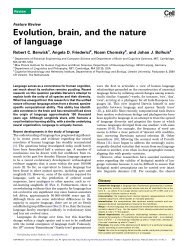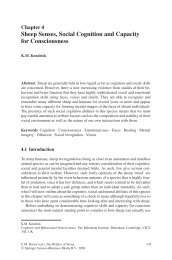Ulric Neisser
Ulric Neisser
Ulric Neisser
You also want an ePaper? Increase the reach of your titles
YUMPU automatically turns print PDFs into web optimized ePapers that Google loves.
The Rising Curve<br />
It was in the course of working on the intelligence report that I first learned about Jim<br />
Flynn's incredible discovery. The average IQ scores of Americans have been rising, at least since<br />
the 1930s, at a rate of some three points per decade! Elsewhere in the world, where there is more<br />
reliance on tests of abstract thinking like "Raven's Progressive Matrices," the rate of gain is more<br />
like seven points per decade. Herrnstein & Murray had christened this rise the "Flynn effect,"<br />
naming it because they couldn't explain it. What could cause such gains? Intrigued by this<br />
mystery at the heart of our basic assumptions about intelligence, I made what had by now<br />
become my habitual response: I organized a conference! It went very well and I was especially<br />
pleased to meet Flynn himself: an eloquent and sophisticated political philosopher from New<br />
Zealand.<br />
It was to be my last conference at Emory: Arden and I decided we had been in Atlanta<br />
long enough. Still having many friends in Ithaca, we wondered whether I could perhaps return to<br />
Cornell. Would the Psychology Department be interested in giving me a half-time non-tenured<br />
three-year-renewable appointment? The answer was yes! So in the spring of 1996 I retired from<br />
Emory, cashed in my TIAA, and bought a little yellow house on the shore of Lake Cayuga. My<br />
duties were not burdensome: I supervised one or two graduate students and taught one<br />
undergraduate course. In the first year I also edited The Rising Curve (1998), an APA book based<br />
on the Flynn-effect conference that I had hosted at Emory. In doing so I was hoping to help<br />
Flynn (an obvious underdog!) in his challenge to the intelligence establishment. The Rising<br />
Curve has been cited fairly often, so I may have succeeded in that aim.<br />
There was still one more book to do: a second edition of Memory Observed, which by<br />
now was seriously out of date. I asked Ira Hyman - once my graduate student at Emory and now<br />
teaching at Western Washington - to help me, and we set to work. In 1982, my problem had been<br />
to find enough good studies to fill even a small book. Now Ira and I had the opposite problem:<br />
the ecological study of memory was booming, and there were far more good papers than we<br />
could possibly include. Anyway we made our selections somehow, keeping some old papers and<br />
adding a lot of new ones. We were generally pleased with "MO-II," which came out in 2000. But<br />
disappointment lay ahead: unlike the first edition of Memory Observed, MO-II has not been<br />
widely used or cited. Maybe the ecological study of memory is just no longer new and exciting;<br />
perhaps books of selected readings are not needed in the age of the internet. Or maybe - it's time<br />
to say this - I've just lost my touch.<br />
One remembered self<br />
More than half a century has passed since the moment - if there was one - when E.G.<br />
Boring's course led me to think "I can do this!" Was there really a single such moment, or have I<br />
just created a "repisodic memory" a la John Dean? The good news about my Pearl Harbor<br />
memory (that it was probably right except for the switch from football to baseball) encourages<br />
me to think that this one may be true too. However that may be, psychology did turn out to be<br />
something I could do as well as something I enjoy doing.<br />
Has my doing it made any difference? Even asking such a question reveals a substantial<br />
level of egotism, but that is not surprising. Autobiography makes dramatists of us all, and I am<br />
not the first who has occasionally been tempted to cast himself as the hero of the play. It seems<br />
likely, then, that my actual role in the half-century of psychology reviewed here was rather<br />
smaller than this essay suggests. After all I was not "the father of cognitive psychology," just the<br />
godfather who named it. (The name was not even very original, given that the Harvard Center for<br />
17




